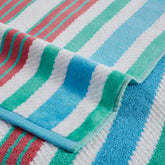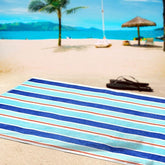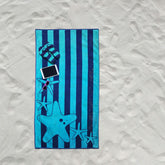Comforters have been a staple in the bedding world for generations. They provide the much-needed warmth and comfort to help you get a good night’s sleep. But what exactly are comforters, and why are they so important? In this blog, we’ll explore the basics of comforters and help you understand what they are and why they are an essential part of your bedding.
Read: 10 Easy Steps Cleaning Your Down Comforter: A Step-by-Step Guide
What Are Comforters?
Comforters are soft and cozy bedding items designed to provide warmth and comfort while you sleep. They are usually filled with materials such as down, feathers, synthetic fibers, or cotton and come in various sizes, weights, and designs. A comforter is a must-have item in your bedding collection, serving as a top layer that keeps you snug and cozy all night long. Whether you prefer a lightweight option for the warmer months or a heavy comforter for the colder nights, there's a comforter out there that will suit your needs and preferences.
Why are Comforters so Important?
Comforters are a crucial part of a good night's sleep, as they provide insulation and keep you warm and cozy in bed. They can also add a decorative touch to your bedroom and improve the overall look and feel of your sleeping space. Whether you sleep hot, have allergies, or simply want a cozy and comfortable bed, a high-quality comforter can make all the difference. By choosing the right comforter for your needs, you can enjoy a more restful and rejuvenating sleep every night.
Types of Comforter Fillings: Which is Right for You?
Comforters can be filled with a variety of materials, each with its own unique benefits and drawbacks. The three most common types of comforter fillings are synthetic fibers, down feathers, and cotton. Synthetic fibers are a popular choice for their affordability and allergen resistance, while down feathers offer ultimate warmth and fluffiness. Cotton comforters are a versatile option that offers breathability and is easy to care for. In this section, we’ll delve into each type of filling and help you decide which one is best for you. Let's take a closer look at synthetic, down, and cotton fillings.
Synthetic Fillings:
Synthetic fillings of comforters are made from a variety of man-made fibers, including polyester, acrylic, and microfiber. Synthetic comforters are popular due to their affordability and resistance to allergens. These comforters are easy to care for and can be machine washed, making them a convenient option for those with busy lifestyles. Synthetic fillings also dry quickly, which is important for those who live in humid climates.
Down Fillings:
Down fillings of comforters are made from the soft and fluffy feathers found under the outer feathers of geese and ducks. Down comforters are highly prized for their warmth and softness, making them an excellent choice for colder climates. These comforters are lightweight and often less bulky than synthetic or cotton options, making them a good choice for those who want a soft and fluffy feel without adding extra weight to their bed. However, down comforters can be more difficult to care for than synthetic options and are more expensive, making them a luxury option for those who are willing to invest in comfort.
Cotton Fillings:
Cotton fillings of comforters are made from natural fibers, making them a popular choice for those who prefer natural products. Cotton comforters are breathable, making them a good choice for those who sleep hot. They are also durable and easy to care for, making them a popular choice for those who want a low-maintenance option. Cotton comforters can be machine washed and dried, and they are often less expensive than down options. However, cotton comforters may not be as warm as synthetic or down options, making them a better choice for those who live in mild climates.
Don'y Miss: Why You Should Invest in a High-Quality Down Comforter: Benefits
Each type of comforter filling offers its own unique benefits and properties. Whether you prefer synthetic, down, or cotton, there is a comforter out there that is perfect for you. Consider your personal preferences and needs, such as budget, care instructions, and climate, to choose the best filling for your comforter.
Comforter Sizes and Weights: Choosing the Right Fit for Your Bed

Comforters come in a variety of sizes to fit different beds, from twin to king. It’s also important to consider the weight of the comforter, as a heavy comforter can be too warm for some people, while a lightweight comforter may not provide enough warmth during the colder months. In this section, we’ll discuss the different sizes and weights available and help you choose the right fit for your bed.
Comforter Sizes:
Comforters are available in several different sizes, including twin, full, queen, king, and California king. Choosing the right size comforter for your bed is important to ensure a good fit. A comforter that is too small will not provide enough coverage, while a comforter that is too large will look overwhelming and not fit properly.
Comforter Weights:
Comforters also come in different weights, ranging from lightweight to extra-heavy. The weight of a comforter is determined by the amount of fill used. Lightweight comforters are great for warmer climates or for those who sleep hot, while heavier comforters are ideal for colder climates. Consider your climate and personal comfort preferences when choosing the weight of your comforter.
Read: Full vs Queen Size Comforter? Key Factors to Help You Decide
Choosing the right size and weight for your comforter is important for ensuring a good fit and comfortable sleep. Consider your bed size and climate when making your decision, and remember that a good comforter should provide enough coverage and warmth without being too overwhelming or too heavy. With the right comforter, you can enjoy a cozy and comfortable sleep every night.
Fabric Options for Comforter Casings: From Cotton to Microfiber
Comforter casings, also known as coverings or shells, are an important aspect to consider when choosing a comforter. The fabric of a comforter’s casing can greatly affect its overall feel and performance. Popular options include cotton, silk, and microfiber. Cotton is a popular choice for its breathability and durability, while silk offers a luxurious feel. Microfiber comforters are a budget-friendly option that is also hypoallergenic. In this section, we’ll explore the various fabric options and help you choose the best one for your needs.
Cotton Casings:
Cotton is a natural fiber that is breathable, soft, and durable. Cotton comforter casings are a popular choice for those who prefer natural materials and want a soft, comfortable feel. Cotton is also hypoallergenic and easy to care for, making it a great choice for those with sensitive skin. Cotton casings can come in a variety of weave patterns, including percale, sateen, and flannel, each offering a unique feel and texture.
Microfiber Casings:
Microfiber is a synthetic material made from tiny fibers that are woven together. Microfiber comforter casings are popular due to their affordability and resistance to allergens. These casings are also lightweight and easy to care for, making them a convenient option for those with busy lifestyles. Microfiber is also known for its soft and silky feel, making it a great choice for those who want a luxurious feel.
Silk Casings:
Silk is a natural fiber that is prized for its softness and luxurious feel. Silk comforter casings are a popular choice for those who want a high-end, sophisticated look. Silk is also hypoallergenic and temperature-regulating, making it a good choice for those who sleep hot or have sensitive skin. However, silk casings can be more difficult to care for than cotton or microfiber options and are often more expensive, making them a luxury option for those who are willing to invest in comfort.
There are many different fabric options for comforter casings, each offering its own unique benefits and properties. Consider your personal preferences, such as budget, care instructions, and comfort, to choose the best casing for your comforter. Whether you prefer cotton, microfiber, or silk, there is a casing out there that suits you best.
Care and Maintenance: Keeping Your Comforter Fresh and Fluffy
Proper care and maintenance can help extend the life of your comforter and keep it looking and feeling great. This can include washing it regularly, storing it properly, and avoiding exposure to allergens. Here are some tips and tricks for keeping your comforter in top condition.
Washing and Drying:
It's important to follow the care instructions on your comforter, as different types of comforters have different care requirements. Down comforters should be cleaned professionally, while synthetic and cotton comforters can often be machine washed and dried. Use a large, front-loading washing machine and a gentle, low-heat cycle when washing your comforter. Avoid using fabric softeners, as they can reduce their insulating ability.
Storing:
When not in use, store your comforter in a cool, dry place. Avoid storing it in a damp or humid environment, as this can cause mold and mildew to grow. Consider using a comforter storage bag to protect it from dust and insects.
Fluffing:
Over time, comforters can become compressed and lose their fluffiness. To restore their fluffiness, simply give them a good shake and fluff them up in the dryer on a low heat cycle with some clean dryer balls.
Proper care and maintenance are important to extend the life of your comforter and keep it fresh and fluffy. By following these tips and tricks, you can enjoy the comfort and warmth of your comforter for many years to come. Remember, always follow the care instructions on your comforter and consult a professional if in doubt.
Best Comforters for Different Needs: Allergies, Hot Sleepers, and More

Everyone has different needs when it comes to comforters, and it’s important to choose one that fits your specific requirements. For example, those with allergies may want to consider a synthetic fiber comforter, while hot sleepers may prefer a lightweight cotton comforter. In this section, we’ll recommend the best comforters for different needs, so you can find the perfect fit.
For Allergies:
For those with allergies, it's important to choose a comforter that is hypoallergenic and free of dust mites and other allergens. A good option is a synthetic comforter filled with hypoallergenic materials, such as microfiber or polyester. Another option is a down alternative comforter, which offers the softness and warmth of down without the risk of allergies.
For Hot Sleepers:
For those who sleep hot, it's important to choose a comforter that is lightweight and breathable. A good option is a cotton or bamboo comforter, as these fabrics are naturally breathable and help regulate body temperature. Another option is a lightweight synthetic comforter, which can be filled with materials that are specifically designed to keep you cool.
For Winter Months:
For those who need a comforter to keep them warm during the winter months, a heavy down or synthetic comforter is a good option. These types of comforters are filled with materials that provide maximum insulation and warmth, making them perfect for colder climates.
For Decoration:
For those who want a comforter that adds a decorative touch to their room, there are many options available. From bold patterns to vibrant colors, some comforters can complement any decor style. Consider a comforter with a beautiful duvet cover for added style and protection.
Choosing the right comforter for your needs can make a big difference in the quality of your sleep. Whether you have allergies, or sleep hot, there is a comforter out there that caters all your needs. Consider your needs and preferences, and choose a comforter that will provide you with comfort and warmth night after night.
Where to Find a Good Comforter?

If you're looking for a comforter that provides comfort, warmth, and style, look no further than Bedding Bag! Our company offers a wide range of high-quality comforters to suit different needs and preferences. Whether you prefer down, synthetic, or a cotton, we have a comforter that's perfect for you.
At Bedding Bag, we understand the importance of a good comforter in a good night's sleep. That's why we offer comforters in a variety of sizes, weights, and fillings, so you can find the perfect one for your bed. Our comforters are made from the highest-quality materials, ensuring durability and long-lasting comfort. Browse our selection today and find the perfect comforter for your bed!
Conclusion: The Importance of a Good Comforter for a Good Night’s Sleep
Comforters play a vital role in providing the comfort and warmth necessary for a good night’s sleep. Whether you prefer synthetic fibers, down feathers, or cotton, there is a comforter out there that is perfect for you. By considering the fillings, sizes, fabrics, and care instructions, you can choose a comforter that will last for years and help you get the rest you need. So, invest in a good comforter today and start enjoying the many benefits of a good night’s sleep.
In conclusion, comforters are a key component of any bedding setup, offering warmth, comfort, and a good night’s sleep. With the information provided in this blog, you can now choose the best comforter for your needs, whether you’re looking for a synthetic, down, or cotton option. Don’t settle for anything less than a cozy and comfortable bed, invest in a good comforter today.







